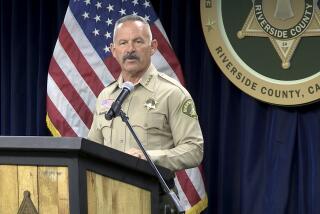Investigation of Deputy Urged in Fatal Drug Raid : Shooting: Ventura prosecutor says the officer might have lied about marijuana plants so authorities could search millionaire’s ranch and seize it.
- Share via
VENTURA — Ventura County Dist. Atty. Michael D. Bradbury on Tuesday blamed the shooting death of a Malibu millionaire on the Los Angeles County Sheriff’s Department and called for a new inquiry into the conduct of a deputy who the prosecutor said may have lied to get a warrant to search the dead man’s ranch for drugs.
Bradbury, concluding a five-month investigation into the Oct. 2 death of Donald P. Scott, also recommended that the Sheriff’s Department re-evaluate its policies for obtaining search warrants “to prevent a recurrence of the events which led to the death of Donald Scott.”
“This search warrant became Donald Scott’s death warrant,” Bradbury said in a 64-page report. He added in an interview: “This guy should not be dead.”
Though acknowledging that he could not prove that any officers broke the law, Bradbury said that Deputy Gary R. Spencer--the lead investigator in the case--was guilty of misconduct and that a federal drug agent could not have seen marijuana plants from 1,000 feet above Scott’s ranch as he said.
The Ventura County prosecutor concluded that Spencer, a veteran narcotics officer with a clean record, used false information to secure a warrant, then led a multi-agency task force to Scott’s isolated ranch in hopes of finding drugs and seizing the $5-million property for the government.
Spencer shot the gun-wielding rancher in self-defense, Bradbury concluded, but the deputy should not have been on the ranch in the first place.
“There was no marijuana on that place,” Bradbury said. “Clearly one of the primary purposes was a land grab by the (Los Angeles County) Sheriff’s Department.”
Under federal forfeiture law, police agencies may seize real estate when a judge rules that the property was used to grow or manufacture drugs or that the property was purchased with the proceeds of drug sales.
Scott, 61, heir to a Europe-based chemicals fortune, was killed in the early morning raid when he emerged sleepy and drunk from his bedroom and allegedly pointed a pistol at Spencer, who shot him twice.
Responding angrily to Bradbury’s report, a Los Angeles County sheriff’s captain said it was not true that his department was motivated in part by a desire to seize Scott’s scenic 200-acre mountain ranch.
“That’s a slur on all of law enforcement,” said Capt. Larry Waldie, head of the sheriff’s Narcotics Bureau. “Forfeiture was never the objective in this case. The district attorney should be dealing with facts, not suggestions or his beliefs.”
Waldie noted that Spencer cooperated fully with the Bradbury inquiry, even offering to take a polygraph test. Bradbury said he did not order a polygraph test because the exams are not reliable.
Waldie also criticized Bradbury for removing a deputy district attorney from the follow-up investigation after her original report said that shooting was justified. The sheriff’s captain suggested that Bradbury, Ventura County’s top prosecutor for 15 years, might be driven by a quest for publicity.
The ABC-TV news program “20/20” began promoting a story on the Scott case Monday, Waldie said.
“I don’t know what his motivation is,” Waldie said, “but I find it rather coincidental that release of his report corresponds with the “20/20” (television) report, particularly since he has delayed the report for so long.”
The Scott case has drawn national attention not only because of Scott’s wealth and eccentricities--he was a heavy-drinking, anti-government recluse once married to a French movie star--but because of his friends’ early assertions that authorities raided the ranch to seize it under federal forfeiture laws.
In his report, Bradbury concluded that the Sheriff’s Department conducted the raid not only to search for 50 marijuana plants that a federal agent said he spotted, but to look for any other drugs that might warrant seizure of Scott’s ranch across the Ventura County line from Malibu.
Two agents on the raid--a state narcotics investigator and a federal forest ranger--said possible seizure of the ranch was mentioned in a sheriff’s briefing immediately before the raid, Bradbury said.
Deputy Spencer thought he might find drugs other than marijuana because sheriff’s investigators knew that Scott’s wife, Frances Plante Scott, had been involved in other drug investigations, Bradbury said.
Plante Scott had been convicted of possessing a small amount of marijuana in 1990. In addition, the Drug Enforcement Administration in 1990 had requested Scott’s phone records for several years.
The deputy also had information about possible heroin smuggling, Bradbury reported. As a result, Spencer “knew that if marijuana were found growing, or if narcotics were found in sufficient quantity, it was possible that a very valuable piece of real estate would be forfeited to the government with proceeds from a sale going to the Los Angeles Sheriff’s Department,” Bradbury concluded.
Plante Scott could not be reached for comment. But her attorney, Eric Ferrer of Los Angeles, said that information about her past has nothing to do with the October raid.
More to Read
Sign up for Essential California
The most important California stories and recommendations in your inbox every morning.
You may occasionally receive promotional content from the Los Angeles Times.










